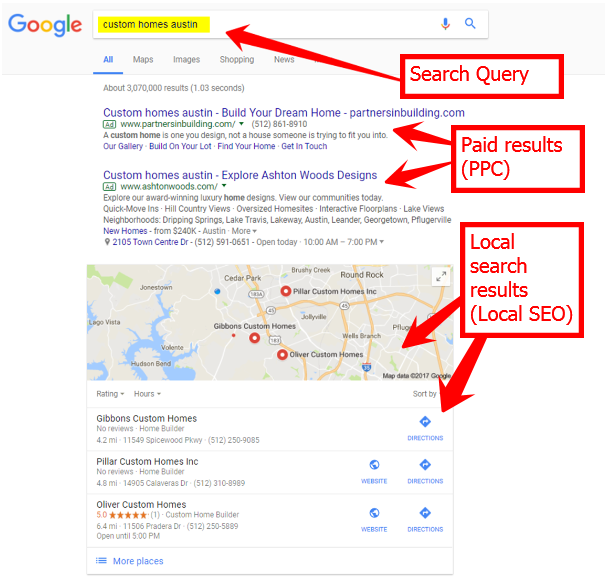How Local SEO is different from SEO, SMO, PPC, and other traffic – and how to optimize it
Before social media optimization (SMO) started taking over the world, local optimization (aka local SEO) was making headway.
Although not as sexy as social media, local optimization could be even more powerful for mom-and-pop businesses like doctors, lawyers, pet stores, hair stylists, and any other business dependent on local customers.
Local optimization is concerned with two types of optimization: local search engine traffic & local non-search engine traffic. I’m primarily concerned with local search engine traffic for this post.
Local businesses should be concerned with three types of search engine results: organic, paid, and local.
Organic relates to the unpaid, natural listings that occur on the results page after a search, often called search engine optimization (SEO). Paid listings relate to the advertising that search engines sell for billions of bucks each year, also known as pay per click advertising (PPC). Local is concerned with local results.
Check out the differences below:
How Local Optimization is Different
Local optimization is similar to SEO because it’s also unpaid – most of the time. That’s why it’s also called “Local SEO” or in our case SEO Austin. However, it’s usually distinguished from organic results because of different ranking factors compared to SEO.
And it should be.
As the name implies, local optimization relates to local businesses – your neighborhood pizza joint or hometown chiropractor. Any business that relies on foot traffic or face-to-face interaction needs local optimization for their website.
In Google, the goal of local optimization is for your website to make it to the 3-pack (aka ‘Snack Pack) – or the top-3 local listings on the page. Your ultimate goal is to get to position #1 in the 3-pack because that will garner the most free traffic.
Here’s a cool video on what is local SEO and how to optimize for it.
Where to Submit Your Local Business Website
The first step to getting your site to the 7-Pack is to submit your site to the major search engines. The engines are good about picking up your local profile, but it’s always better to self-manage your online presence instead of letting them do it for you.
Here are the links that you need to submit your site:
- Google’s local engine is now called Google My Business: Google My Business
- Bing is also called Bing Places for Business: Bing Places
- Yahoo is still called Yahoo Small Business: Yahoo! Small Business
- Yelp is a great local search engine with local reviews of the products and services they need.
Local optimization is not just for search engines. In fact, there could be more combined traffic on sites like Yelp and Citysearch. To submit to even more places, checkout this post: Get Listings from Other Sites or even more here.
How to Optimize Your Local Listing
Local profiles don’t optimize themselves.
I’ve had success optimizing sites for local clients and it always takes time and work. Local profiles need tweaks, reviews, and more for higher local ranks in the search engines.
After submitting your local profiles at the major search engines, the first thing to do is to build out the profile, meaning make sure to fill out all the fields they allow you to. i.e keywords, categories, description. Make sure your address is the same on all your profiles. Build out your local profiles first and then worry about other things – that way visitors will like what they see if they land on your profile.
It’s the same thing with building out a webpage. You need to engender trust with both the search engine and the user in order to merit a higher rank in local search. In addition, it helps the user experience. You may get the click from the search engine, but if prospects don’t like your website, you wasted the visit.
For more tips on local optimization for the search engines, check out the definitive resource for local SEO ranking factors:
Moz’s Local Search Ranking Factors
Bonus Tip: Use a Local Listing Service
One of the quick ways to take care of 90% of local listing issues is to use a local listing service. These services consolidate all the information you need to update onto a single dashboard and make your life mush easier. The cost is modest, but the work saved is huge. Here are a few local listing services we’ve used.
Need Help with Local Optimization?
All this local optimization can be confusing. What to do first, second, or tenth may not be something you want to deal with. So feel free to contact us with questions about local SEO, or organic SEO and beyond!
(512) 669-1446



Thank you, I found this very helpful, I appreciate you posting this article.